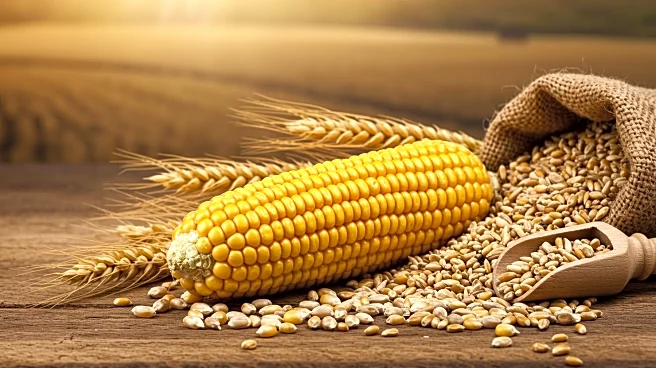What's Happening?
The USDA has announced the purchase of 124,000 metric tons of corn for the 2025/2026 marketing year, with unknown destinations. This announcement comes as grain markets show mixed trends. December corn prices have risen slightly to $4.07 per bushel, while November soybeans have increased to $10.43 per bushel. However, wheat prices have seen a decline, with December CBOT wheat down to $5.24 per bushel. The Pro Farmer Midwest Crop Tour is underway, providing insights into corn and soybean crop conditions across the Midwest. Arlan Suderman, chief commodities economist at StoneX, highlighted the importance of scout reports from the tour, noting that the U.S. corn crop is maturing quickly, which could negatively impact yield due to smaller kernel sizes.
Why It's Important?
The USDA's corn purchase is significant as it reflects ongoing demand and market dynamics in the agricultural sector. The mixed trends in grain prices indicate varying conditions and expectations for different crops. The Pro Farmer Midwest Crop Tour's findings are crucial for stakeholders, as they provide real-time insights into crop health and potential yield outcomes. The rapid maturation of the corn crop could lead to lower yields, affecting supply and pricing. These developments have implications for farmers, traders, and consumers, influencing decisions related to planting, harvesting, and market strategies.
What's Next?
The Pro Farmer Midwest Crop Tour will continue to provide updates, which could influence market expectations and pricing. Stakeholders will be closely monitoring the tour's findings, particularly regarding corn yield predictions. The USDA's purchase may lead to further market adjustments as traders and farmers respond to demand signals. Additionally, the maturation process of the corn crop will be watched closely, as it could impact harvest outcomes and future pricing. Market participants will need to adapt to these evolving conditions to optimize their strategies.
Beyond the Headlines
The rapid maturation of the corn crop raises concerns about long-term agricultural practices and climate impacts. Smaller kernel sizes could become a recurring issue if similar weather patterns persist, prompting discussions on crop resilience and adaptation strategies. The Pro Farmer Midwest Crop Tour's historical routes may need reevaluation to better capture high-production areas, ensuring more accurate assessments of crop conditions. These factors highlight the need for ongoing innovation and adaptation in agricultural practices to mitigate risks and enhance productivity.











